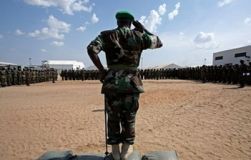UN chief urges Sudan to approve Darfur force composition
November 7, 2007 (UNITED NATIONS) — UN Secretary General Ban Ki-moon called on Sudan on Wednesday to quickly approve the makeup of a U.N.-African Union peacekeeping force in Darfur, but Khartoum faulted donor states for delaying its deployment.
 “The situation in Darfur is at a crossroads,” Ban said in his latest monthly report on implementing a July Security Council resolution authorizing the U.N.-African Union force.
“The situation in Darfur is at a crossroads,” Ban said in his latest monthly report on implementing a July Security Council resolution authorizing the U.N.-African Union force.
He said peace talks in Libya launched last month presented a unique opportunity that must be seized by all parties, and timely deployment of the peacekeeping force was critical.
Ban warned that preparations for the joint UNAMID peacekeeping force to take over from a hard-pressed AU force at the end of this year were being hampered by poor security and because Sudan has yet to approve the composition of the force.
“I am concerned that the security incidents over the past month and the continuing delays in the deployment of UNAMID could lead to a further deterioration in the situation on the ground,” he said.
Sudanese President Omar Hassan al-Bashir, who has been accused by the United States and other Western countries of foot-dragging on the peacekeepers, said he was ready for the force to be deployed, but funding was an obstacle.
“We have comprehensive agreements with the United Nations. … All that is needed now is the execution of funding,” Bashir told a news conference with South African President Thabo Mbeki in South Africa.
A U.N. official said the world body had mechanisms in place to spend money before a budget is officially approved and it was already doing so to support the AU force. “What’s at issue are the operational challenges of moving into an area as inhospitable as Darfur,” the official said.
Mbeki also faulted donor countries for not meeting their commitments on Sudan: “We have to go back to the people who made the pledges and ask them the question … why have you not honoured your promises?”
HELICOPTERS LACKING
The main shortfall in contributions to the force is helicopters. No country has offered the 24 transport and attack helicopters needed to help the planned force of up to 26,000 operate in an area the size of France.
“Without these critical units, the mission will not be able to implement its mandate,” Ban said in the report.
Save Darfur, an umbrella group of 180 international activist groups, said on Wednesday it had sent letters to the governments of 17 countries urging them to offer helicopters.
The list includes South Africa, as well as Canada, Poland, France, Russia, Egypt, Britain, Turkey, India and Ukraine.
One Western diplomat cited two main reasons why potential providers of helicopters had not come forward: some were already overstretched by military deployments overseas; others were concerned about whether the untested command and control structure of the U.N.-AU force would work properly.
Ban said the United Nations and the African Union had presented a list of proposed troop contributors to Khartoum on October 2, but had yet to hear back.
The U.N. resolution said the force would be “predominantly” African and Khartoum has been resisting most non-African participation. Washington has said it will consider further sanctions if Sudan continues its delaying tactics.
Ban said the current package of troop contributors was backed by the head of the AU and “any diminishment of its capacity would put the mission at risk.”
“I look forward to the government of Sudan’s positive response on UNAMID’s force composition because it is now critical to move toward deployment without further delay.”
Peace efforts suffered a setback last month after several rebel groups boycotted peace talks in Libya. “It was very distressing that some of them decided to stay away from the recent peace conference held in Libya,” Mbeki said.
The bloodshed in Darfur has killed 200,000 people in 4 1/2 years, by international estimates. Khartoum says only 9,000 have died since rebels took up arms against the government in 2003 and accuses critics of exaggerating the crisis.
Accused by critics of backing the Janjaweed militias blamed for much of the violence, the Sudanese government has also been criticized by U.N. aid officials and independent charities for imposing bureaucratic obstacles to humanitarian work.
The United Nations said on Wednesday regional authorities in south Darfur had expelled the chief U.N. humanitarian official there, accusing him of unspecified rule violations.
(Reuters)
